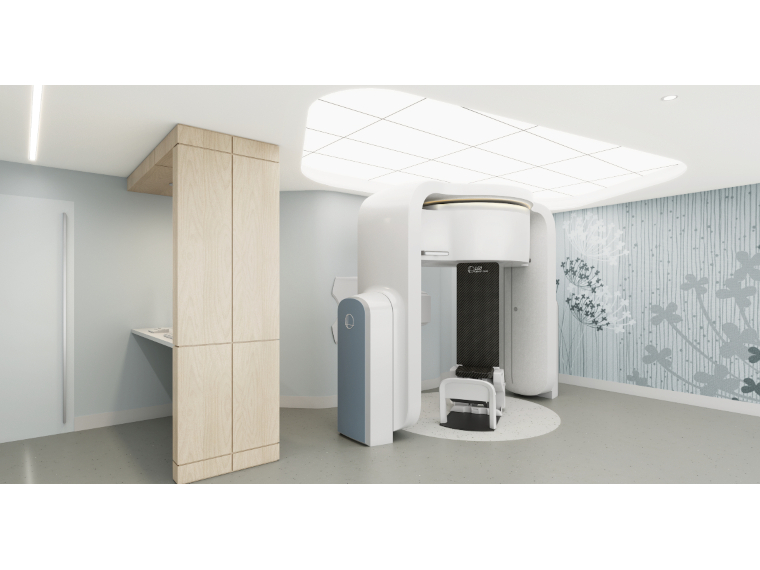Featured photo: Leo’s upright proton therapy technology
FLINT, Mich. — The McLaren Proton Therapy Center is poised to become the first in the
world to deliver proton therapy to patients with Leo Cancer Care’s ground-breaking upright
treatment technology. In a landmark agreement, Leo Cancer Care will install two upright
units at the McLaren Proton Therapy Center in Flint, Michigan, with the first patients set to
receive care via the innovative treatment delivery system within the next two years upon
receipt of FDA’s clearance for the technology.
“The goal of Leo Cancer Care and McLaren Proton Therapy Center’s collaboration is to bring
proton therapy to more patients, and we know there are clear advantages with proton
therapy,” said Stephen Towe, CEO, Leo Cancer Care.
“The McLaren Proton Therapy Center is well positioned to become the first to potentially treat patients with the revolutionary Leo Cancer Care technology,” Towe added.
Towe noted research highlighting that upright positioning results in less organ movement
during treatment. It also creates better communication channels between the patient and
clinician. Proton therapy delivers highly targeted doses of radiation to cancer cells while
sparing healthy tissue, reducing side effects, and resulting in successful outcomes. Benefits of
delivering radiation therapy to patients seated in an upright position include comfort and a
better patient experience compared to laying down on a table.
The McLaren Proton Therapy Center, part of the Karmanos Cancer Institute at McLaren
Flint, is already the largest proton center in Michigan. The new Leo Cancer Care technology
will increase patient throughput, improving access to proton therapy for patients afflicted
with cancer in Michigan and beyond.
“McLaren and Karmanos are committed to delivering world-class, comprehensive cancer
care right in Genesee County,” said Chris Candela, president and CEO of McLaren Flint.
“The aim of our innovative partnership with Leo Cancer Care is to provide greater access to proton
therapy for patients throughout Michigan and around the globe,” Candela added.
The inclusion of the LEO Cancer Care Technology and expansion of the McLaren Proton Therapy Center is part of a larger project to grow and improve McLaren Flint’s Comprehensive Cancer Program.
Patient throughput
McLaren has ordered two ‘MarieTM’ units from Leo Cancer Care, with both fitting into an
area earmarked for a single conventional rotating gantry (where patients lay horizontally) at
its existing proton center.
Towe explained: “Once we saw the site, we explained we could add a dividing wall through
the middle of the room and put two of our treatment devices in the same space that they
were originally going to have one conventional gantry. It effectively doubles patient
throughput from the same footprint.”
With the equipment taking up half the space, and effectively half the cost of conventional
radiotherapy units, the agreement has important commercial and economic benefits for the
healthcare provider.
Marie units
Marie, Leo’s comprehensive solution for upright particle therapy, is named after physicist
and chemist Marie Curie, who spearheaded research into radioactivity.
It features dual-energy diagnostic quality CT at the treatment isocenter to enable state of the
art adaptive therapy; a stationary fixed beam delivery system that will improve reliability,
beam parameters and accuracy while at the same time reducing maintenance costs; and a
sophisticated patient positioning system, allowing for imaging, and treating of all particle
therapy-specific anatomical sites in the upright position.
In addition, less shielding is required and there are advantages in terms of installation,
maintenance and running costs.
The installation will help increase patient flow through McLaren’s existing proton therapy
center as part of its routine care delivery and treatment of patients with lung, breast and
prostate cancers.
Smaller footprint
The technology brings a new dimension to cancer treatment by keeping the radiation beam
fixed and slowly rotating the patient while seated in an upright position. This means the units – which are a quarter the size of conventional proton therapy machines- have a significantly smaller footprint to make optimum use of healthcare space. The shift away from rotating a large radiation generation source around a patient, to keeping the radiation source fixed and slowly rotating the patient, also reduces cost of equipment and construction.
“McLaren will realize a sizable capital cost reduction by implementing the LEO Cancer Care
upright positioning and imaging system instead of our present three story, one hundred plus
ton, rotating gantry solution” said Daniel Medrano, co- director of Research and
Development for the McLaren Proton Therapy System.
Increased capacity
Underlining the benefits of the Marie system, which has previously been used in research
applications, Towe said: “What this shows very clearly is that you can utilize space more
effectively with a fixed beam and fit more of these treatment rooms into the same space, and
as a result have more beam time to treat patients.”
“Two treatment rooms double the patient throughput; it is great for the hospital and great
for patients because it will deliver more patient capacity at the McLaren Proton Therapy
Center.”
With the building planning and project delivery schedule now under way, the aim is to be
treating patients with these upright machines within two years upon receipt of FDA’s
clearance for the technology.
The equipment does not currently have a CE mark in the EU or an FDA 510k clearance in
the US, but Leo is in the process of acquiring those regulatory approvals, which will be in
place prior to the installation at the Flint site.
Learn more at mclaren.org/protontherapy.


